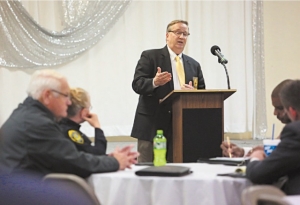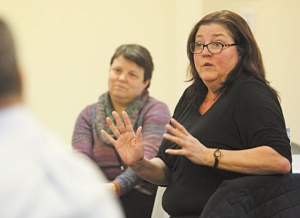Safety, guns at heart of meeting
By Joey Pitchford
Published in News on March 8, 2018 9:30 PM

News-Argus/CASEY MOZINGO
Sheriff Larry Pierce speaks about what his department is doing to help prevent incidents like the recent shooting in Florida at a gun and school safety meeting held at Rebuilding Broken places Thursday night. The meeting was organized by Impact Teens and Operation Unite Goldsboro.

News-Argus/CASEY MOZINGO
Beth Castrati asks questions about things being put in place in the school system to help students report threats or talk about their own feelings at a gun and school safety meeting held at Rebuilding Broken places Thursday night.
In the wake of the shooting at Stoneman Douglas High School in Parkland, Florida, community leaders in Wayne County are not shying away from the hard questions.
Around 30 people from across the Goldsboro and Wayne County community -- including Sheriff Larry Pierce, Goldsboro Police Chief Mike West, Wayne County Public Schools Superintendent Dr. Michael Dunsmore, city councilman Gene Aycock and many others -- came together at Rebuilding Broken Places Thursday evening to discuss gun safety and ways to keep schools safer.
Over the course of a nearly two-hour discussion, the attendees tackled topics ranging from proper firearms handling and how to identify people who may be considering committing a shooting to active shooter protocols in schools, the importance of mental health resources and gun control.
Hosted by Impact Teens Goldsboro and Operation Unite Goldsboro, the meeting began with GPD housing officer Michael Rivers and Capt. LeAnn Rabun.
They discussed keeping an open dialogue with kids in order to watch for potential gun violence and proper gun safety in the home and at the shooting range.
Their comments segued into those of Pierce and West. Pierce updated the audience about steps his office has taken to increase security at schools, including using overtime pay to hire more officers so that all schools will have a law enforcement presence every day.
Referring to reports that armed security officers at Stoneman Douglas failed to address the shooter, attendee Lashaundon Perkins asked both men how they could inspire confidence in the community that their officers would not let them down.
West said that training makes a difference.
"In the past, we had been trained to wait for another officer and go in as a team," he said. "Now, we are trained to go in, locate the threat and neutralize the threat as quickly as possible."
The training is difficult, West said, because officers must learn to ignore potentially injured students and staff in order to find and eliminate the shooter before they hurt more people. West suggested bringing community stakeholders to see the GPD's summer training sessions -- often held in schools -- so that they can see firsthand how their officers are learning to deal with active shooter situations.
Once the floor was open for discussion, members of the audience brought up the issue of mental health. Beth Castrati, a local mental health professional, said that she rarely encounters clients who are outright threats to commit a school shooting.
Rather, she sees kids who have anxiety or anger issues, problems which -- if ignored -- could eventually culminate in a student wanting to do harm.
Mental health is only part of the problem, several attendees said. Charlene Clarkson, leader of Goldsboro Indivisible, said that gun control was an elephant in the room that she intended to talk about.
"If you're going to contact legislators, contact them and ask why these guns are available to 18 year olds," she said. "We can make every reason, the FBI missed the signs, the sheriffs department missed the signs. An 18 year old purchased an AR-15 and went into the school and killed 17 people."
The audience applauded Clarkson's comments. Operation Unite Goldsboro founder Mark Colebrook, who moderated the meetings, said that focusing on ways the individual can make an impact for students in Wayne County is just as important as long-term goals like gun legislation.
"Those are things not beyond our information and knowledge, but at this point beyond our control," he said. "Definitely, legislation and voting, all of those things will come into place, but we want to make sure that the things we're focusing on today are the things we can get our hands around right now."
That is not to say that the community should ignore long-term issues like voting and gun laws, he said, but rather that kids in Wayne County need reassurance now that something is being done to keep them safe.
To that end, Colebrook drafted a set of goals to pursue. Those included working with Eastpointe managed care organization and the school system to find mental health professionals willing to volunteer in schools, and setting up a work group to look more in depth at other issues and find solutions. He urged adults in the community to pay more attention to kids and show them that they matter.
"Us adults, we live in our own little worlds, and we'll walk right by kids. They often don't think we care. They don't thing we see them. Ask them how they're doing," he said. "They'll look at you like 'who are they talking to,'" but if enough people do it, soon they'll start to think 'hey, they actually do care how I'm doing.'"
